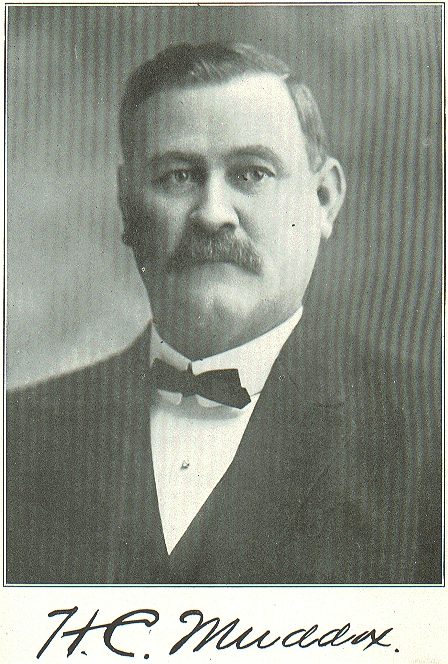
Harry C. Muddox
A special atmosphere of interest envelops the men who have been identified with the commercial, manufacturing and material upbuilding of the West. A difficult although ardent task confronts the one who attempts to delineate their life activities and to bestow adequate appreciation upon the high inspirational force of their characters. Most pronounced is this lack of adequate expression in instances of personal association with the best interests of a city or commonwealth through a long period of the eventful years, and such an instance appears in the successful enterprises of Mr. Muddox. From the time of his arrival in Sacramento, May 4, 1872, when a child scarcely six years old of age, he viewed the environment of his future home, up to the present time he has witnessed the steadfast development of the community, has felt the impetus of the western progress and in the work of advancement has been an important factor through various lines of endeavor. Many movements inseparable from the history of this capital city have witnessed his association and been promoted by his indefatigable earnestness. It is impossible to measure the height or sound the depth of his connection with local affairs; suffice it to state and that no measure has been presented of importance to the general welfare that fails of his support he may with justice claim that in some respects his own history is the history of business progress in Sacramento.
And honorable lineage indicates the identification of the Muddox family with England during past generations. In the year 1862 George and Isabelle Muddox, who had been born, reared and married in the city of London, crossed the ocean to the United States and settled in Illinois, where Harry C. Muddox was born in the city of Alton, Ill., August 26, 1866, he being the eldest in a family of seven children. In a few years his parents became dissatisfied with their prospects in Illinois and determined to seek a new location in the far west. The decision made, they made preparations and then crossed the plains on one of the early overland emigrant trains that required fourteen days to reach Sacramento. During 1878 Mr. Muddox started a pottery and sewer pipe factory on the corner of K and Thirtieth streets and there he remained in business until his death in 1899, when Harry C. purchased the entire plant from the estate. Since then he has continued as sole owner and manager. From the time of taking over the plant he began to make improvements. The entire works were remodeled. The work on rebuilding necessitated much expense and consumed much time, but its value is easily apparent to the most casual observer. Today the plant ranks as one of the largest, most complete and modern sewer pipe works on the Pacific coast, and the remarkable development may be attributed to the sagacious management of Mr. Muddox, who having entered the pottery in early life and learned the business in all of its details, has been able to utilize his thorough knowledge for the permanent upbuilding of the business and the increased efficiency of the equipment.
The management of the plant by no means represents the limit of the business activities of Mr. Muddox, who is indeed one of the leading businessmen and financiers of Sacramento and is now president of the Citizens Bank, a director of the Capital National Bank and also a director of the Capital Bank & Trust Company of Sacramento. Upon the organization of the Capital Fire Insurance Company of California, January 21, 1911, his energy in the promoting of the new concern was recognized in his election as president of the company and chairman of the board of directors, in which capacity he since has served with the same zeal, the same high-minded devotion and the same power of concentration notable in his every association. Outside of financial and business interests, he has found leisure to participate in the workings of the Sons of St. George, the presidency of which he has filled with honor, in addition to having served as a delicate to the Grand Lodge during nine different sessions. At Vacaville, Solano County, this state, August 26, 1893, he married Jessie E. Long, who was born, reared and educated in that city. They are the parents of three children, Ruth Fay, Forest C. and Isabelle E.
Source: “History of Sacramento County California” by William L. Willis. 1913. Pgs. 478-481.
Submitted by: Nancy Pratt Melton